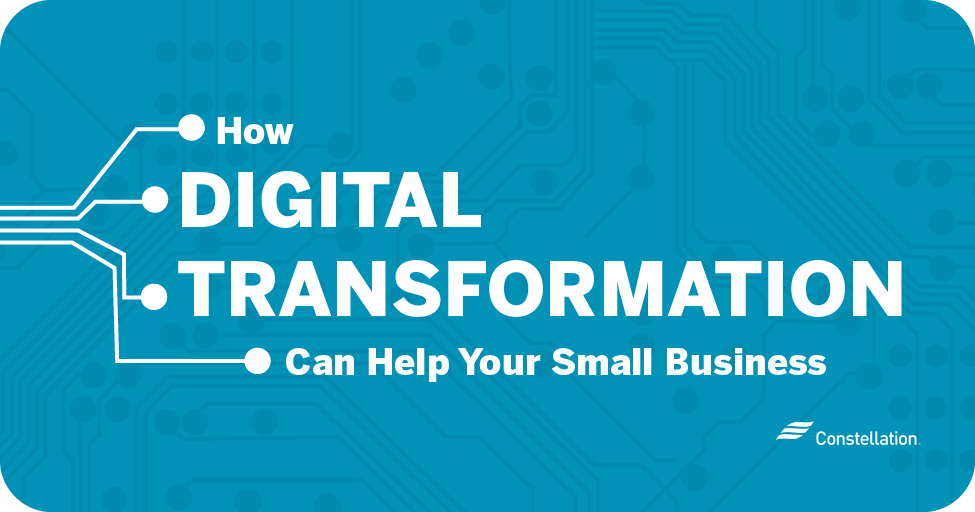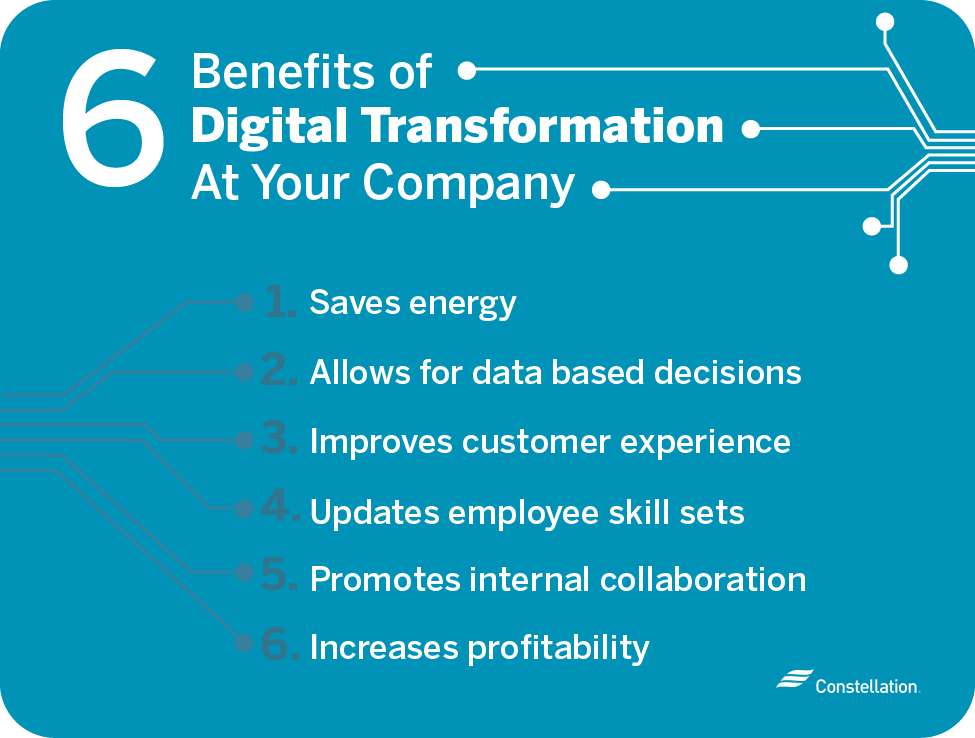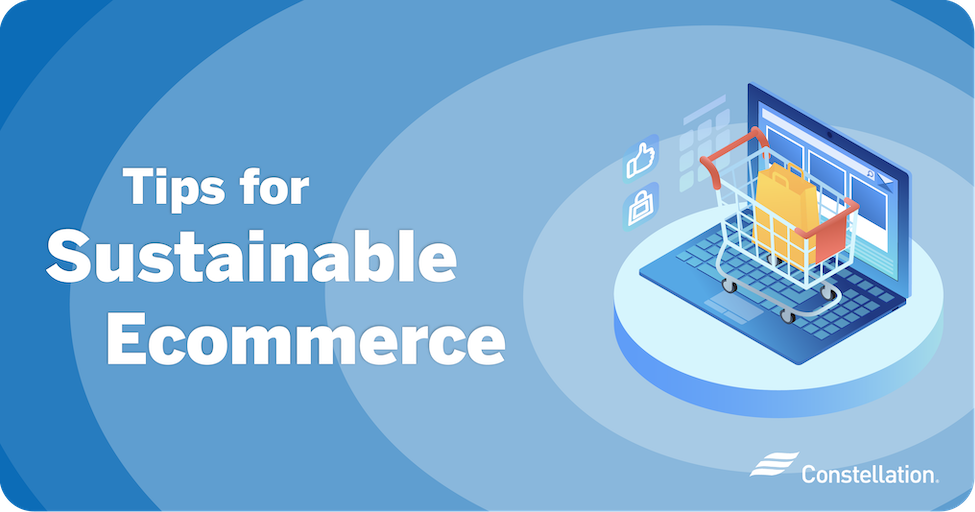
- Category:
Small Business Energy Savings -
Last updated:
February 22, 2022
How Digital Transformation Can Help Your Small Business Evolve & Save Energy
When you’re considering just what digital transformation is, the topic can seem almost overwhelmingly broad. Digital transformation strategies are having an impact everywhere in business: designing and producing products, managing employees, going to market and serving customers, dealing with finances and risk, and operating physical workplaces.
The efficiencies and improvements in productivity, sustainability and customer satisfaction are benefits of digital transformation driving investment in this area. Despite being dependent on electricity, digital transformation in business can reduce energy usage and costs.
What is digital transformation?
Digital transformation is the use of digital business technology to change how you operate and serve customers. The benefits of digital transformation are better information and control, improved communication and cost savings, to name a few. If you adopt a digital transformation strategy, it will change the way your company operates, which can affect everything from your corporate culture to your energy usage.
Is digital transformation important for small businesses?
Small-business digital transformation is especially attractive because it becomes a “force multiplier” for your operations and resources. You really can do more with less. Employees with digital tools for small businesses are more productive and are better managed.
You can reach more customers and serve them better. And you can do it all with better control of costs and more efficient use of energy through monitoring and smart systems.
Choosing a digital transformation strategy that saves energy for your small business
Digital transformation is different for every business. It depends on what digital transformation strategy you pursue, the needs of your organization, your corporate culture and the business needs you address.
For many, small-business digital transformation is best done step by step according to a careful plan that accounts for costs and benefits. It could mean moving to chatbots in your small business to replace paper-based service management. Or it could mean creating a smart office with technology that controls equipment, lights and your HVAC system. One major cost in any strategy can be energy usage, so considering impacts and ways to save are important.
What are the challenges of digital transformation?
Small-business digital transformation has huge promise, but it can be tricky. You have to weigh complex choices, find reliable metrics to use in planning, understand the costs, worry about security and judge the ability of your organization — and your customers — to change.
- Changes in energy usage. Old ways of doing things use less energy — you don’t have to plug in an abacus. But a computer returns so much more value for energy used that it’s worth it. In addition, making the right choices and adopting the right technologies can cut overall energy consumption.
- Initial upfront costs. Digital transformation in business requires an initial investment that can be daunting. Many organizations and governments recognize the benefits and offer a variety of ways to finance the energy efficiency that digital transformation delivers.
- Employee training. The key to managing the cultural impact of your digital transformation strategy is training. Engage employees early and provide plenty of education and support.
- Adjusting existing customer expectations. Getting customers on board is as important as dealing with employees. Your patrons will also want an answer to the question, What is digital transformation? Explain the benefits they’ll enjoy, keep lines of communication open and regularly update customers on changes and benefits.
- Online security. Digital tools for small business often fall into the “internet of things” category. Connected devices that collect data represent a security and privacy challenge. Thinking about protecting data and systems needs to be part of every plan.
Benefits of digital transformation
Although there may be challenges to overcome, the benefits of digital transformation in business can greatly outweigh them. Here’s a look at the upside of going digital, in greater detail:

1. Saves energy
Digital transformation uses energy and saves it — but only if you take the right approach. With all the complexity involved in digital transformation planning, it’s easy for small businesses to overlook details and make energy mistakes. The costs of these errors can add up and bleed away the value that you hope to obtain in making digital investments.
Strategies for saving energy during your digital transformation
With some rules of thumb, you can avoid the big energy-wasting mistakes most commonly made. Keeping the following core strategies in mind every step of the way can keep you in the green, both in saving money and in saving energy.
- Go paperless. It takes energy to make and ship paper as well as to print and distribute documents . Going paperless in your small business cuts all that waste.
- Transition to laptop computers. Right-size your computing power. Laptops consume less energy than a desktop and, in most cases, deliver the same functionality.
- Invest in updated Wi-Fi technology. Updating your network to more-efficient equipment does more than improve speed, it can cut the power consumption of your Wi-Fi router. And keep an eye out for new Wi-Fi technologies, like Passive Wi-Fi, that are cutting energy consumption even more.
- Consider the cloud. Moving heavy-duty computing work off-site can move energy-consuming and heat-producing equipment off your balance sheet and your power bill. Another one of the benefits of cloud computing is that employees can have secure access remotely so you can cut energy used commuting.
- Switch to SSD storage. Solid-state drives (SSDs) have fewer moving parts and don’t need fans for cooling. The result is that they use half as much power as traditional hard disk drives (HDDs).
- Get employees on board. Educating, inspiring and involving employees gets everyone aligned and contributing. It’ll help motivate compliance with energy-saving measures and will spark ideas that can add effectiveness.
2. Allows for data-based decisions
Making decisions that are informed by facts reduces the risk of getting it wrong. Detailed data lets you fine-tune. Digital tools for small businesses include sensors for capturing and sharing data, along with computing power and apps to synthesize it and analyze it.
Most systems provide a customizable dashboard that allows you to see the data you need to monitor trends and make decisions. Efficient use of data reduces risks, optimizes choices made and saves resources. For instance, an energy monitoring system helps you make data-informed decisions about how your business consumes power.
3. Improves customer experience
Customer service and delivering a memorable experience is where investing in digital transformation can really pay off for your small business. Technology makes it easy to connect to your customer online and in the real world, across platforms. Digital tools also let you gather customer information to better understand and serve them in engaging and personalized ways.
4. Updates employee skill sets
Digital transformation isn’t an event; it’s an ongoing reality of business. Innovation is a constant. Employees always need to be learning and improving their digital literacy just to keep pace. But the upside is that employees with up-to-date skills are more valuable to your company and helpful to your customers.
5. Promotes internal collaboration
Connectivity is a core aspect of digital transformation strategies. It’s more than just connecting systems and sensors; it connects your teams. Digital tools help employees work together, even when off-site, sharing data, deliverables and insights for solving problems. It helps everyone work together to serve customers and develop innovations. The value of connected collaboration can revolutionize your business.
6. Increases profitability
It all comes down to the bottom line. Saving money, serving the customer, innovating, reducing risk, working smarter and being more efficient are all ways to grow revenue, cut costs and boost profit. The bottom-line benefit of digital transformation for your small business is long-term. As your business performs better — with enhanced customer experiences, better products, efficient controls and better decisions — success builds on success for a sustainable and growing profit picture.
When should my small business make a digital transformation?
The best time to start your small-business digital transition is now. The benefits to your business — even taking just the first steps — can be substantial.
As with any large endeavor, planning is important if you’re to get the most value from your investment. Taking measured steps is easier on the budget and helps you focus on optimizing each phase. Saving energy should be at the core of your initiative, ensuring efficiency, effectiveness and profitability.




